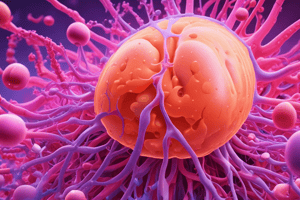Podcast
Questions and Answers
What are the multiple functions of the kidneys?
What are the multiple functions of the kidneys?
The multiple functions of the kidneys include plasma filtering, hormonal functions, and urine generation, as well as regulation of water, excretion, hormone synthesis, electrolytes balance, acid-base balance, glucose, amino acids, urea, creatinine, urate, and urine.
What is the mechanism of renal tubular transport?
What is the mechanism of renal tubular transport?
The lecture describes the mechanisms of renal tubular transport and the glomerular membrane structure.
What is the consequence of damage to nephrons?
What is the consequence of damage to nephrons?
Damage to these nephrons can result in kidney failure.
What are the multiple functions of the kidneys?
What are the multiple functions of the kidneys?
How is GFR estimated?
How is GFR estimated?
What can cause fatal heart rhythms and is often associated with kidney disease?
What can cause fatal heart rhythms and is often associated with kidney disease?
What is the formula used to calculate GFR and what do the variables represent?
What is the formula used to calculate GFR and what do the variables represent?
What is the significance of proteinuria in relation to kidney function?
What is the significance of proteinuria in relation to kidney function?
What are two diagnostic tests that can be used to diagnose kidney diseases?
What are two diagnostic tests that can be used to diagnose kidney diseases?
What is acute kidney injury (AKI)?
What is acute kidney injury (AKI)?
What are the causes of AKI?
What are the causes of AKI?
What are some ways to manage AKI?
What are some ways to manage AKI?
What is chronic kidney disease?
What is chronic kidney disease?
What are some causes of proteinuria?
What are some causes of proteinuria?
What is uremia?
What is uremia?
What are some of the clinical biochemistry parameters used to monitor kidney disease?
What are some of the clinical biochemistry parameters used to monitor kidney disease?
What is the mortality rate for patients with AKI and non-renal organ system failure in intensive care patients?
What is the mortality rate for patients with AKI and non-renal organ system failure in intensive care patients?
What is the importance of using biomarkers alongside clinical presentations?
What is the importance of using biomarkers alongside clinical presentations?
What is the most common histological finding in Acute Kidney Injury (AKI)?
What is the most common histological finding in Acute Kidney Injury (AKI)?
What is the difference between Acute Kidney Injury (AKI) and Chronic Kidney Disease (CKD)?
What is the difference between Acute Kidney Injury (AKI) and Chronic Kidney Disease (CKD)?
What is the risk marker for diabetic nephropathy, lupus erythematosus, and types of kidney diseases?
What is the risk marker for diabetic nephropathy, lupus erythematosus, and types of kidney diseases?
What is the mortality rate of uncomplicated AKI?
What is the mortality rate of uncomplicated AKI?
What are the mortality rates of AKI complicating non-renal organ failure in intensive care patients?
What are the mortality rates of AKI complicating non-renal organ failure in intensive care patients?
What is the importance of biochemical monitoring during recovery phases in renal diseases?
What is the importance of biochemical monitoring during recovery phases in renal diseases?
What are the kidneys responsible for?
What are the kidneys responsible for?
What are the functional units of the kidneys?
What are the functional units of the kidneys?
What are some of the hormonal functions of the kidneys?
What are some of the hormonal functions of the kidneys?
What are some tests used to assess renal function?
What are some tests used to assess renal function?
What is the glomerular filtrate?
What is the glomerular filtrate?
What is the importance of glomerular function?
What is the importance of glomerular function?
What is glomerular filtration rate (GFR) used for?
What is glomerular filtration rate (GFR) used for?
What is the significance of proteinuria in kidney disease?
What is the significance of proteinuria in kidney disease?
Flashcards are hidden until you start studying
Study Notes
Renal Disease: Anatomy, Function, and Biochemical Assessment
- The kidneys are a paired organ system responsible for plasma filtering and urine generation.
- Nephrons are the functional units of the kidneys and any damage to them can result in kidney failure.
- The kidneys have hormonal functions, including the production of calcitriol (active Vitamin D) and renin-angiotensin-aldosterone system.
- Tests to assess renal function include urine and blood tests, as well as assessment of glomerular and tubular function.
- Urinalysis can be performed using reagent strip "dipstick" testing to detect white blood cells, hemoglobin, glucose, and protein urea.
- Urea and creatinine are commonly used biomarkers to assess renal function, with high levels indicating impaired glomerular function and low levels indicating good glomerular function.
- Potassium levels can also indicate kidney disease, with high levels potentially causing abnormal heart rhythms.
- The glomerular filtrate is an ultrafiltrate of plasma, and adequate glomerular function is important for maintaining fluid/electrolyte/pH balance.
- Glomerular filtration rate (GFR) is a widely accepted measure of kidney function, and a decrease in GFR precedes renal failure.
- Proteinuria, or the presence of larger amounts of protein in urine, can indicate kidney damage and lead to further testing.
- Imaging tests such as ultrasound, CT, MRI, isotope scanning, and renal biopsy can also be used to detect renal disease.
- Understanding the anatomy, function, and biochemical assessment of the kidneys is important in the diagnosis, treatment, and monitoring of renal disease.
Studying That Suits You
Use AI to generate personalized quizzes and flashcards to suit your learning preferences.



